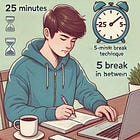
I studied Psychology at the University of Buenos Aires, Argentina.
I understand how frustrating studying can be, especially when we are pressured by our family, ourselves, or friends. Then, our mind starts to play games, and stress, depression, and anxiety arise.
If you’re in this situation, don’t panic. I learned a few tricks to keep my notes well enough and avoid burning out during my exams. I achieved this while engaging in an active social life, extra-academic work, and sleeping 8 hours.
These are my secrets, which I elaborated more in my free eBook:
1. The PARA Method
Organization is key.
However, it is underrated. To reduce stress and improve your grades at school or University, you should first organize all your files and course schedules.
I find the PARA method to be the ideal approach for this.
In short, you create four folders in your computer, Drive, OneDrive, or your cloud/storage system of reference. Then, you order your files based on priorities:
Projects: your top and finite responsibility.
Area of responsibility: your “infinite” responsibility.
Resource: information that can be useful for other projects or ideas.
Archive: Projects that you have already finished.
2. Meta-Learning
Meta-learning is about knowing how knowledge is structured in a particular topic.
For example, if you’re learning machine learning, then you should know that you need skills and knowledge in programming, data analysis, math (calculus, linear algebra, probability, etc.), and statistics.
Target your topic and break it down into smaller subtopics.
Ask yourself: What is more relevant? What do I need to master this?
This will help you prevent and study better.
3. Effective Study Strategies
Another crucial point.
Ineffective study strategies are those that keep information in your short-term working memory. This also gives you a false sense of understanding, fooling you into believing you learned something when you didn’t (the illusion of learning).
If you want better grades, you should use effective study strategies like:
Retrieval.
Spaced practice.
Interleaving.
Interrogative elaboration.
Concrete examples.
Dual coding.
You can read more about them here.
4. Focus
Procrastination is the students’ worst enemy.
Avoiding it by 100% is impossible. But there are some tricks to help you reduce them considerably. For example, you can tell yourself to start getting things done by only studying for 20 minutes.
Yes, 20 or 15 minutes is all you need to start doing that thing.
If you’re willing to do more, you can apply the Pomodoro technique, which can also help you manage your time.
5. Time Management
Another underrated skill.
Stop saying yes to everything when you don’t know if your calendar is full. That was a terrible mistake I made when studying and working in a research internship. However, the main problem is that we usually don’t know how long it will take us.
I found that the Pomodoro technique is extremely helpful for this.
In a nutshell, it works as follows:
Focus for 25 minutes.
Take a break of 5 minutes.
Repeat the process 3 times.
Take a long break of 25 minutes.
This not only helps you with focus but also with time management.
Because it makes you aware of how much time a task takes you.
6. Use A Second Brain
Cognitive overload is a serious thing.
Sadly, in these times, information is everywhere: news, social media, work, meetings, skills to learn, etc. Trying to remember everything is simply impossible.
A quick and effective solution is using an extended, digital brain.
That’s a second brain.
There, you can store all the relevant knowledge, such as meetings, notes from books, scientific articles, meetings, etc. You can store, organize, and retrieve anything you want. There are many software to build your first second brain, such as Notion, Obsidian, or Evernote.
Which one suits you best depends on your goals.
7. Build A Learning System
Finally, having a learning system can revolutionize your studies forever.
A system allows you to organize any learning target and tackle it effectively. It consists of different cognitive steps, decomposing tasks into smaller ones to make them approachable.
My learning system involves everything I have shared with you here.
It is 100% customizable by you.
And it is why I tricked my brain into loving learning hard skills.
Ultra-learning saved my career.
It helped me learn anything without overstudying or overworking. But remember, each person has a different life. Perhaps you work full-time and also study. Or maybe you have a family, etc.
Be reasonable, and don’t fall into toxic productivity.
Here are some last recommendations:
Don’t compare yourself with others. Take your time.
This is not a competition. This is about you. Make it fun and healthy.
Please take care of yourself. That’s the most important thing!
Now it is your turn.
What are you going to learn next?
Until the next time,
Axel








Thanks for this excellent explanation. You’re a great teacher